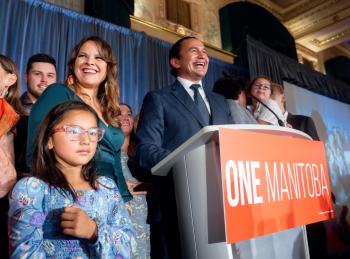Image Caption
Summary
Local Journalism Initiative Reporter
Windspeaker.com
The orange wave that swept across Manitoba last night brought with it historical change, pushing Wab Kinew and his NDP into a majority government after seven years of Progressive Conservative reign.
Kinew, who is Anishinaabe, made history as the first First Nation premier of any province, a status he did not formally acknowledge in his 15-minute victory speech.
Assembly of Manitoba Chiefs (AMC) Grand Chief Cathy Merrick told Windspeaker.com Wednesday that she was not surprised that he said nothing.
“He is a humble man and a very dedicated advocate for our people. He knows, and we as First Nations know, what this victory means,” she said.
Outgoing Progressive Conservative premier Heather Stefanson did recognize the significance of Kinew's victory.
“This election was a very important one and the historic nature of Mr. Kinew’s victory must be acknowledged here this evening. Wab, I hope that your win tonight inspires a future generation of Indigenous youth to get involved in our democratic process, not just here in Manitoba but right across the country,” said Stefanson.
Merrick agreed.
“First Nations and Indigenous people must be involved in every level of government. Our participation is critical to ensure we are protecting our rights. And when we do this, we honour our ancestors who fought hard for our rights,” she said.
Stefanson ended her speech by announcing she would be stepping down as leader of the party. At press time, Stefanson was leading in her Tuxedo riding in Winnipeg by a margin of 2.6 per cent over NDP candidate Larissa Ashdown.
The Progressive Conservatives went into the election with 35 seats. At press time, Stefanson’s party had won or were leading in 22 seats.
Kinew easily retook his seat of Fort Rouge in Winnipeg, winning more than half the ballots cast. The NDP went from 18 seats before the election to winning or leading in 34 seats at press time. Twenty-nine seats were needed to form a majority government.
Kinew’s victory address echoed his campaign, focusing on health care and affordability. He also pulled Manitobans together, asking those who didn’t vote NDP to give the party a chance.
“There is one thing that the results of tonight's vote show crystal clear and it is we can do amazing things when we stand together as one province. We can accomplish awesome tasks when we stand together as one people. And there is no challenge that we cannot meet when we unite as one Manitoba,” said Kinew.
He also addressed the young people in the crowd, adding “…young niijiis, in particular.” Niijii (or neechies) is an Ojibwe word meaning “my friend.” He said, “I was given a second chance in life and I would like to think that I made good on that opportunity. And you can do the same.”
Kinew’s reference was of difficulty he faced with substance abuse and the law in the early 2000s.
Merrick said Kinew’s words to young people were “very exciting and inspiring.”
“Seek your vision. Seek your vision. Dreams come true,” Kinew said, his voice breaking.
“Up until now, I could only imagine what it would be like to have a First Nations person in the premier’s chair. This morning, that dream is a reality!” said Southern Chiefs’ Organization (SCO) Grand Chief Jerry Daniels in a statement.
Both Daniels and Merrick said Kinew’s win was not totally unexpected.
“For the first time, it seems like First Nations and Indigenous people have a fair shot at not becoming political yo-yos,” said Merrick.
Both leaders expect to forge a meaningful relationship with Kinew in his new position.
Daniels says SCO will continue to highlight key issues to improve the lives of its citizens, including affordable housing, and decreasing racism in the healthcare, policing, and correctional systems.
“SCO will also hold premier-designate Kinew to his promise to support a search of the landfill for our murdered sisters,” said Daniels.
Merrick says she expects Kinew to be busy in the coming days, but she did “anticipate” a conversation and meeting. She said along with a congratulatory letter, her office had also sent Kinew an invitation to attend the upcoming AMC assembly, Oct. 17 to Oct. 19.
In other election results last night, another NDP Indigenous candidate to win big was Red River Métis Robert Loiselle, who defeated incumbent Liberal leader Dougald Lamont in the riding of St. Boniface. Lamont stepped down as Liberal leader as well.
The Liberals went into the night with three seats but managed to hold on to only one.
Other Indigenous NDP incumbents to hold on to their seats included Anishinaabe-Métis Bernadette Smith (Point Douglas), former Shamattawa First Nation chief Eric Redhead (Thompson), Sagkeeng Anishnaabe First Nation member Nahanni Fontaine (St. Johns), Opaskwayak Cree Nation member Amanda Lathlin (The Pas-Kameesak), and former chief of Hollow Water First Nation Ian Bushie (Keewatinook).
PC incumbent and Métis Bob Lagasse also successfully defended his seat in Dawson Trail.
The NDP had 45.4 per cent of the popular vote while the PC’s had earned 41.9 per cent. The Liberals were a distant third at 10.8 per cent.
There was a record number of ballots cast in advanced polling at 200,790, almost one quarter of eligible voters.
Local Journalism Initiative Reporters are supported by a financial contribution made by the Government of Canada.

